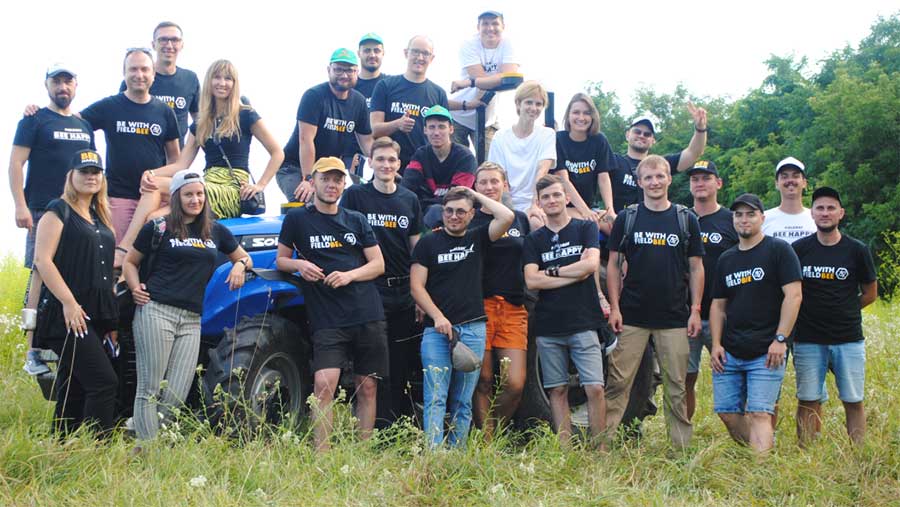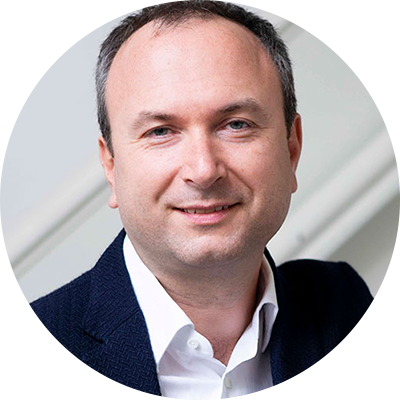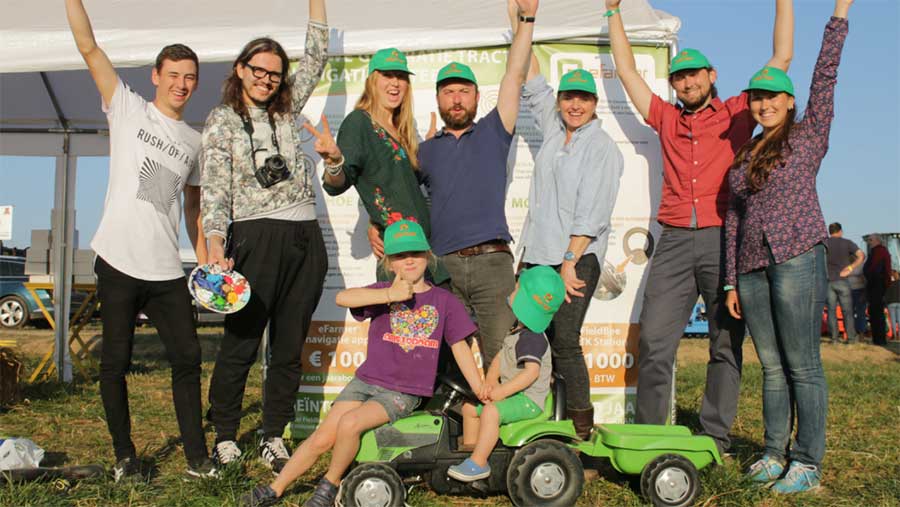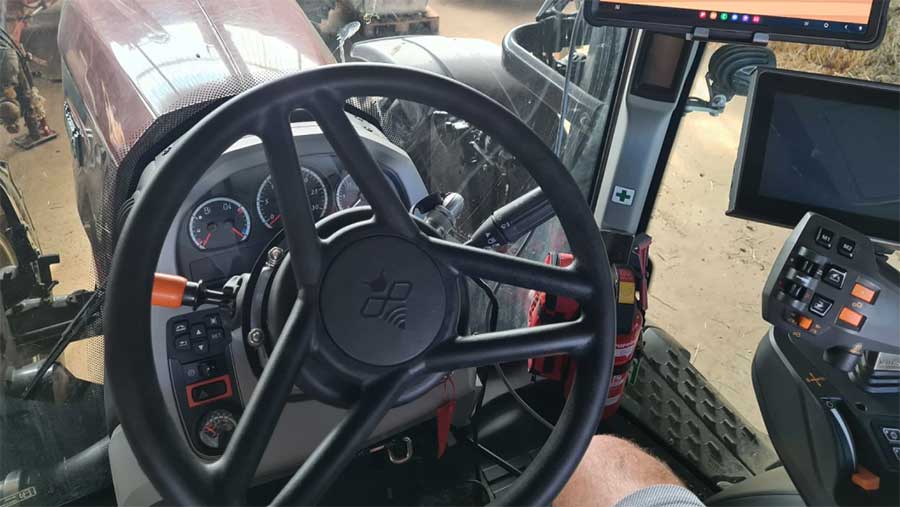Advertiser content
How precision farming tech company FieldBee started
 © FieldBee
© FieldBee
About the author
 Michael Utkin is co-founder and CEO at FieldBee. His family moved to the Netherlands in 2013, and after a successful career in high-tech, social, and energy businesses, Michael was looking for a new challenge where he could leverage his entrepreneurial skills and ambition to make a difference.
Michael Utkin is co-founder and CEO at FieldBee. His family moved to the Netherlands in 2013, and after a successful career in high-tech, social, and energy businesses, Michael was looking for a new challenge where he could leverage his entrepreneurial skills and ambition to make a difference.
A former colleague, who later became my partner and CTO of FieldBee, Alexey Bogatyryov approached me and introduced me to the world of high tech for agriculture.
He was a lead developer of a Ukrainian cloud-based mobile farm management system for large agricultural enterprises called “eFarmer”.
He explained that helping farmers with technology will help as food demand worldwide increases while supply is limited and under stress.
I liked that idea, as my father was developing similar types of technologies back in the 1980s, and put some effort into meeting farmers in Europe and discovering their technology needs.
After a 3-month investigation, we have found that a GPS combined with documentation is something that most farmers need but cannot have the investment returned due to the high cost and complexity of the current offerings.
After discussing with Alexey and his teammates, and my family members, I decided to develop this idea.
What has FieldBee been able to create over the past 10 years?
Our mission is to provide accessible intelligence and machine automation for high-quality fieldwork on every farm and under all conditions.
Being true to this mission we create products that aim to democratise precision agriculture.
We were one of the first companies to create a mobile guidance app, probably the first company to crowd-fund our R&D from farmers, and one of the first companies who sell guidance and steering directly to farmers online.
We strive to create out-of-box products; thus we designed and manufactured our proprietary product components, GPS receivers, steering controllers, and interfaces so we can control the user experience without relying heavily on 3rd party products.
We were able to create a strong base of customers who helped us to test new features and products, our Facebook client community is over 1000 people.
Our dealer network is growing too, now we have more than 50 partners around the world.
All this growth is enabled by our team who are now 90 people located in more than 10 European countries.

© FieldBee
What is the role of innovation in the creation of FieldBee products?
The world is everchanging and we need to change to keep up with this. Economical, societal, market, and technological forces are constantly on the move.
We must innovate or die. Thus, in our Company, we focus on product, process, and business innovations.
The pace of technology development is astounding; to develop our products we look at technologies that will be there tomorrow and not today.
Today some technology may be very expensive and difficult to use, but we know that tomorrow the price and complexity are going to go down, thus the only way to be competitive tomorrow is to innovate.
Our first product innovations were to use of a smartphone instead of machinery terminals, the use of drone microcontrollers, and GPS for agriculture machinery control.
As the company grows, we constantly change our processes and find innovative ways to deliver high-quality products and services to farmers more efficiently.
Some examples include the creation of our assembly line to make sure that the products are being thoroughly tested, and the implementation of various kinds of IT systems that enable quick and efficient decision-making.
Our innovation in direct marketing and sales to farmers is helping us to be closer to farmers and build our brand in the market.
How important a role do farmers have in the projects created?
Me and my co-founder are not farmers, so we had to quickly have some farmers on the team.
Thus, by creating a mobile app we got in touch with many farmers worldwide.
Crowdfunding helped us in 2016 and in 2022. So, without farmers, there’s no food but also no FieldBee.

© FieldBee
The impact of the situation in Ukraine on the company
Luckily due to appropriate risk mitigation actions, we were able to help many of our Ukrainian employees and their families to be relatively safe and have electricity and the Internet whether in Ukraine or being relocated abroad.
On the 25th of February 2022, one day after the start of the war the Company has re-started its usual business processes such as customer support and R&D.
While the company survived, the Company could not get an investment as our prior negotiations turned sour.
Only with the help of farmers who preordered PowerSteer tractor steering systems, we were able to have enough liquidity to continue our operations.
After the move of our R&D and Production to Poland we were able to secure investment in December 2022. The consequence of this delay was that we missed one agricultural season with the launch of our new product.
The biggest challenge during the last 10 years of running FieldBee?
Over these 10 years, we had several biggest challenges. In the beginning was to get a product market fit, then build good products that can work in the field, then to get investment, and then to scale our sales and distribution.
Plans for the company’s development in the next 10 years.
In terms of our products and tech, we constantly work on three horizons.
Horizon 1 – our PowerSteer, automatic steering system and PowerGuide, tractor guidance. Here our goal is to finish the development of all the features that we planned.
Horizon 2 – new products, where we work on products and solutions for implementing control, new versions of PowerSteer, and products for automating machine work for various niche crops.
Horizon 3 – products that will be needed in 5-10 years. Agriculture robotics and AI are coming, the industry is slowly moving in this direction, we want to stay ahead of the curve and are now developing, in cooperation with our partners, various products and solutions in this space.
What products is the company working on now?
We are now working on a product for vineyards, we will present it this year in EIMA Bologna, Italy.
The greatest strength and support to run the business gives me…?
Once I saw a meme, “When you are in stress, just farm”. So, the inner strength and energy to carry on I derive from our mission to help farmers.
From knowing that by helping farmers to be more efficient and sustainable I do something good.
Every time I eat food I give thanks to farmers and feel that my life has meaning and that some part of me is in that food that I eat.
During some hard and stressful times, I enjoy going to see our customers and hearing their stories about how our products help them.
This is how I get the support to go forward because I know that the business is right and is done for the right reason.
What is the history of your education and career path?
I studied in schools in Belarus, Ukraine, and the UK.
My career started in the high-tech industry in Ukraine where I was doing marketing, product management, and business development for the largest IT company in Eastern Europe.
After that, I spent 3 years working on social projects such as running a music recording and film dubbing studio and managing a large private cultural centre.
Then I worked in an investment company and as a director and of a large electricity generation and transmission public utilities company as the CFO.
After that, it was only FieldBee and some education cultural projects and now volunteering to help Ukraine as my social responsibility.
The greatest strength of FieldBee is….?
I think our greatest strength is our team and our resilience.
What is something you want to change about the company?
I would like to have an opportunity for every member of the company to meet each other offline more frequently, which is currently not possible for many of our employees today, as nothing beats personal contact.
What does a typical workday for a CEO look like?
A usual day while I am not traveling, which takes about 30% of my time visiting farmers, partners and suppliers, starts with planning the day and motivation for each meeting or task.
What do you do when you are outside the office?
I am a father of two children, and I try to spend my time with them as much as possible.
In my free time, I like to study Eastern philosophy, do volunteer work, practice yoga and hike in nature.
What do you find is the best way of communicating?
I like personal meetings, as I am a strong believer in personal connection, once it is established it is possible to take meetings online via video calls.
What inspired you to choose this path in business?
Three things that have inspired me to start this business. First, I am continuing in the footsteps of my father who, in 1980s, as an engineer, developed a controller with which one operator could remotely control more than 10 tractors simultaneously.
Secondly, Ukraine is famous for agriculture and tech, so I wanted to create a company that would be successful in the intersection of these two domains.
And thirdly, I really liked the people whom I have met during this entrepreneurship journey, who like their farming profession, who enjoy working in the field, being independent, resourceful, and humble.
I felt that I wanted and was able to help them in their hard work so they could be happy and successful.
Qualities of the right leader?
The main quality of the leader is to help his people unlock their potential in the Company. Thus, being more of a coach than a superhero.
What about this company makes you the most proud?
I like the atmosphere around the office, so this company was able to unify bright motivated people, who despite different backgrounds, languages, and geographical locations, despite all the uncertainties choose to dedicate themselves to our mission.
What are the warning signs that a company culture isn’t what it should be?
Around 3 years ago we developed company values that emphasise the behaviour that we would like to promote in the company and behaviour that is not welcome.
Thus, it is quite easy to understand if we have a fit during interviews and to understand if something is wrong, so we can make corrective actions.
What changes would you like to bring into the industry?
We are bringing products that work out of the box, that are simple and easy to use, such products don’t require installation and settings support, products that can be easily upgraded, supported and changed between machines regardless of their colour.
Right now, we focus on the tractor autosteering kits, but we see more and more autonomous kits coming to the market that make machines autonomous. Thus, we consider this as a big opportunity t make these kits affordable and easy to use.
With development of robotics, we see that farming as a service business models are now possible. This unlocks a whole new chapter merging faring and tech companies.
Can you give some tips for youngsters who aspire to make it big?
First check your motivation, why do you want to do what you want to do?
If the motivation is to make it big or become famous and rich, then this motivation cannot get one a farm because business is a marathon and not a sprint and one needs a lot of energy to carry on.
However, if the motivation is helping others with their pains or making them happy with new developments, then this motivation brings a lot of energy as one takes responsibility for others and this responsibility gives the strength to go forward.
What was your most difficult career-related decision so far?
Once in 2016 we ran out of cash, so I had to let go of the team members except two.
This decision was quite difficult to make, to accept the reality that we could not go own as before.
We pivoted, made changes and carried on as we still had some chances that we could take, and it worked. So, unless all the doors are closed, there is still a chance to succeed.
What is the best advice that someone has ever given you?
The business is a product of the mind of the founder or top manager.
Thus, everything in business depends on the mind of the manager, so if you want to change something in the Company first you have to work on yourself.
If you could, what other industries would you like to partake in?
We had a couple of engineering projects in which we have used our navigation technologies for use cases in transportation, logistics and road construction industries.
We do have opportunities in these and many other industries, but right now we are focused on agriculture and will remain so for years to come as I see so many opportunities and niche markets that require automation
What’s the latest technology that you think can change your industry?
As connectivity is becoming a staple around the world, smart robotics and decision support systems will be the next best thing.
Many companies are working in this area, but nobody has cracked it technically, and develop the technology can work on all the farms, crops and soil conditions.
Do you think there’s a place for new startups in this industry?
A million things can be done, this is why I like this space as opportunities are endless and there is no Microsoft.
How do you stay informed about industry trends and developments?
I read the press and subscribe for news updates, I also visit conferences and exhibitions.
But mainly the trends are from the world of mouth as during these 10 years we have a lot of business connections and friends who work in this area and share the news.
How do you stay motivated and focused on goals?
I have said something of this sort earlier, but to sum up I want to help others, and I do that via my company that helps farmers who feed the world.
What are the biggest challenges your company is facing today?
The biggest challenge right now is to build a strong dealer network around Europe.
We are focused on this, we have brought many experienced sales and marketing managers to the team, I expect that next year we think that we can be proud of our achievements.
Provided by
FieldBee is a leading provider of precision guidance farming solutions, offering GPS autosteering systems and farming software to enhance agricultural efficiency, reduce costs, and promote sustainable practices.
